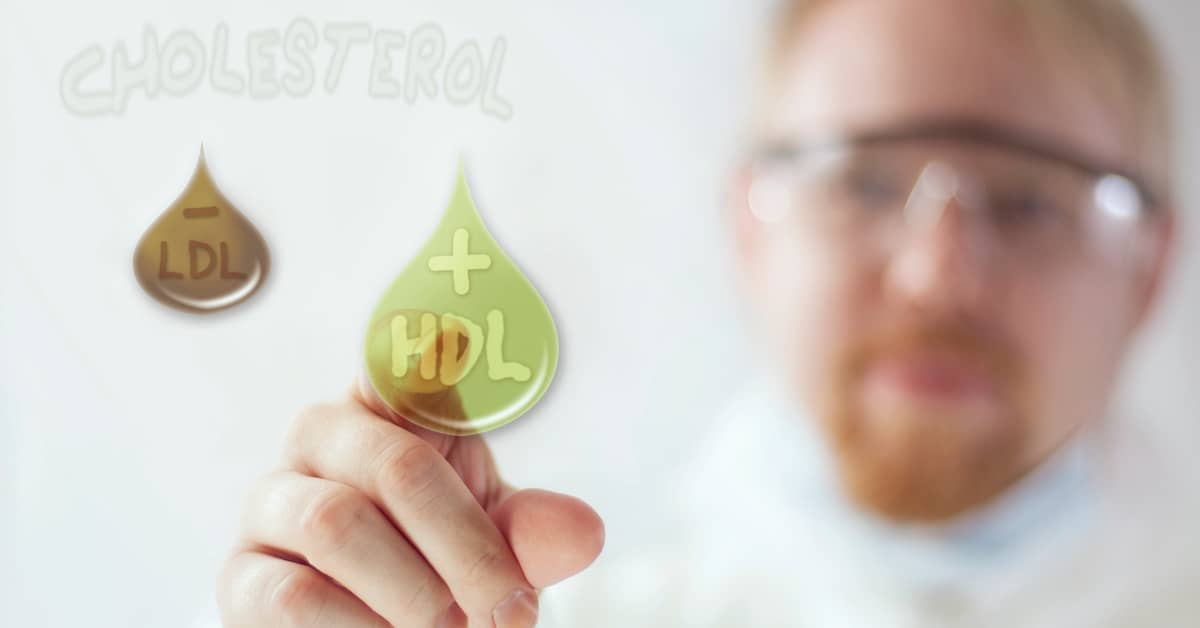
You’ve been told for years to fear cholesterol—to watch your numbers and keep them low or risk heart disease. But what if that advice was only part of the truth? What if a certain kind of cholesterol doesn’t destroy your health, but protects your brain from one of the most terrifying diseases of our time? New research is unraveling a surprising twist in the cholesterol story—one that could hold the key to preventing Alzheimer’s disease before it ever begins. And it all starts with a tiny, powerful particle hiding in your spinal fluid…
Key Takeaways
-
Small HDL particles- in cerebrospinal fluid are linked to better cognitive performance, even in individuals at genetic risk for Alzheimer’s.
-
These HDL particles- protect brain cells by clearing toxic plaques, reducing inflammation, and enhancing neural communication, acting like a lubricant for the brain.
-
Lifestyle changes—like consuming omega-3-rich foods, purple produce, olive oil, and exercising regularly—can naturally increase HDL cholesterol and protect brain health.
Why Brain-Protecting Cholesterol Might Be the Secret to Aging Smarter
Ask any mainstream doctor what they think about cholesterol, and you’ll probably get the same old tired answer… “It’ll give you heart disease.”
But here’s what they won’t tell you…
There’s a certain type of cholesterol that can have a positive impact on your health and aging.
New research from the Keck School of Medicine at USC shows that having HIGHER levels of this cholesterol can help you stop Alzheimer’s before it starts.
Here’s everything you need to know…
By now, you’re well aware that your body contains two main types of cholesterol – low-density lipoprotein (LDL) and high-density lipoprotein (HDL). You may recall that LDL, or “bad” cholesterol, is the type your mainstream doctor is typically concerned about. That’s because it can stiffen and clog your arteries and lead to a deadly heart attack or stroke.
You’ve also heard how HDL or “good” cholesterol can shield you from these terrible heart problems. It does this by pushing LDL away from your arteries, much like a snowplow clears the roadways by pushing snow away.1
Well, this “good” HDL cholesterol is the one that researchers examined in this latest study on brain health.
HDL Cholesterol Beats Back Alzheimer’s
Scientists analyzed the blood plasma and cerebrospinal fluid of 180 seniors. The researchers also used ion mobility – a technique that measures and counts the size of HDL particles. Then the team administered cognitive tests to some of the participants.
At the end, they uncovered some fantastic results…
Folks with more HDL particles in their spinal fluid performed better on cognitive tests regardless of outside factors, including age, gender, and genetic predisposition for Alzheimer’s.
Researchers also reported that these HDL cholesterol particles in the brain are different from the HDL cholesterol particles in the bloodstream. They’re smaller in size and work with a protein called apolipoprotein E (APOE).
You may recall hearing about the gene APOE4. It’s a gene that scientists have linked to a greater risk of developing Alzheimer’s and is widely considered a negative in the fight against dementia. However, a specific mutation of this gene appears to be a good thing and can help clear toxins from your brain.
And here’s where the story gets even more interesting…
In the study, the folks with higher levels of small HDL particles also had increased levels of amyloid-beta 42 in their cerebrospinal fluid.
You’re aware that amyloid-beta is the sticky plaque that can accumulate in the brain and create the misfold in neurons that triggers the development of Alzheimer’s disease. But the new research shows that having more of these small HDL particles circulating around your brain and spine can lower your disease risk.2 Here’s why…
Lubrication for Your Brain?
Researchers believe that HDL cholesterol protects against Alzheimer’s disease for two reasons: First, because it can clear away the plaques and tangles that cause cognitive issues (which may be why people with higher levels of small HDL particles also have an increase in amyloid-beta plaque particles in their bloodstream). Second, because this HDL can build a barrier around your brain and nerve cells. This powerful insulation helps brain cells send signals to one another for repair and growth.
Additionally, HDL cholesterol can lower inflammation in and around your brain, which, as you know, is a well-known trigger for Alzheimer’s disease.
Take all these actions together, and researchers liken HDL cholesterol to a lubricant for brain cells that tunes up your cognitive function.
“What we’re finding here is that before the onset of cognitive impairment, these oils — small HDL particles — are lubricating the system and keeping it healthy,” says Hussein Yassine, M.D., an associate professor of medicine and neurology at the Keck School of Medicine.3
How to Boost Your HDL
There’s no doubt conventional medicine will one day suggest that you take a prescription pill to increase your levels of HDL cholesterol. But the truth is, you don’t need to. Several simple diet and lifestyle changes can boost your “good” HDL cholesterol and the health of your brain simultaneously. These include:<.p>
-
Eating purple foods like red cabbage, eggplant, and berries
-
Cooking with and eating antioxidant-rich olive oil4
-
Getting regular exercise can also increase your HDL levels. But this doesn’t mean you need to train for a marathon. Instead, you can simply walk around the neighborhood, do a few laps in the pool, or attend a community yoga class.5
What’s more, increasing your HDL cholesterol levels by following these diet and lifestyle changes will no doubt give you a wealth of other health benefits and improve your overall well-being. And that’s something no pill can provide!
Summary
Scientists from USC’s Keck School of Medicine have discovered that small HDL cholesterol particles in the brain’s cerebrospinal fluid are linked to better cognitive performance, even in those genetically predisposed to Alzheimer’s. These particles help clear harmful plaques, reduce inflammation, and support neuron repair and communication functions critical in preventing cognitive decline. The exciting part? You can increase your HDL levels naturally through diet and exercise, potentially giving your brain long-term protection against Alzheimer’s disease.
Frequently Asked Questions
What is HDL cholesterol, and why is it called “good” cholesterol?
HDL (high-density lipoprotein) cholesterol helps remove LDL (“bad”) cholesterol from the bloodstream and, according to new research, may also protect the brain from Alzheimer’s.
How does HDL cholesterol help prevent Alzheimer’s disease?
Small HDL particles in the brain clear toxic amyloid-beta plaques, reduce inflammation, and help neurons communicate and repair—factors crucial for maintaining memory and cognition.
Are brain HDL particles different from those in the bloodstream?
Yes. Brain HDL particles are smaller and interact with specific proteins like APOE to enhance protective effects in the central nervous system.
Can I boost HDL cholesterol naturally?
Yes. Regular exercise, eating omega-3-rich foods, consuming purple vegetables and berries, and using olive oil can all raise HDL levels.
Does having high HDL mean I won’t get Alzheimer’s?
Not necessarily, but higher levels of small HDL particles have been associated with better cognitive function and reduced risk in recent studies.
- American Heart Association. (n.d.). HDL (good), LDL (bad) cholesterol and triglycerides.
- Martinez, A. E., Weissberger, G., Kuklenyik, Z., He, X., Meuret, C., Parekh, T., Rees, J. C., Parks, B. A., Gardner, M. S., King, S. M., Collier, T. S., Harrington, M. G., Sweeney, M. D., Wang, X., Zlokovic, B. V., Joe, E., Nation, D. A., Schneider, L. S., Chui, H. C., Barr, J. R., Han, S. D., Krauss, R. M., & Yassine, H. N. (2022). The small HDL particle hypothesis of Alzheimer’s disease. Alzheimer’s & Dementia.
- Lewis, W. (2022, April 13). Small ‘good cholesterol’ particles may have a role in Alzheimer’s prevention: First-ever study to measure high-density lipoprotein particle numbers in spinal fluid led by Keck School of Medicine of USC [Press release]. Keck School of Medicine of USC.
- Spritzler, F. (2025, May 20). 9 ways to increase your HDL (good) cholesterol levels. Medical News Today.
- Story, C. M. (2024, July 29). Lowering your high cholesterol: 6 exercises that will pay off. Healthline
